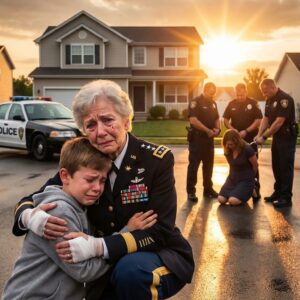The autumn wind rustled through the maple trees lining Cedar Street, scattering red and gold leaves across the neatly maintained lawns of suburban Boston. Seven-year-old Ethan Baker sat cross-legged on his bedroom floor, methodically arranging his collection of Hot Wheels by color spectrum—a jagged rainbow of metal and plastic against the blue carpet his mother had chosen three years ago.
From downstairs, the domestic symphony of dinner preparation drifted up: the clinking of heavy pots, the rhythmic, aggressive chopping of vegetables, and the occasional sharp sigh of exasperation that seemed to accompany everything my stepfather did.
My name is Ethan. I was seven then, and small for my age. I remember my hands pausing over a bright yellow Corvette as my sister Lily’s footsteps hurried past my door. She was retreating to her room again, a sanctuary that had become more like a prison cell in recent months.
I remembered when Lily used to play with me after school. She would help me build elaborate racetracks that snaked across the living room floor, or read me stories using funny, distinct voices for every character. That was before Richard moved in. Before Mom started picking up extra shifts at the hospital to pay for the “lifestyle upgrades” Richard insisted we needed. Before Lily stopped smiling so much.
“Lily!” Richard’s voice boomed from the kitchen, vibrating through the floorboards. “Get down here and set the table.”
I heard my sister’s door open and close, her footsteps now slower, hesitant. I abandoned my cars and crept to my doorway, peering down the hallway. Lily appeared at the top of the stairs, her long brown hair hanging forward like a curtain to hide her face. She wore an oversized gray sweater she’d barely taken off since school started, even though the house was stiflingly warm.
“Move it!” Richard barked. “I don’t have all day to wait for you to do a simple task.”
I watched as my twelve-year-old sister descended the stairs, one hand trailing along the banister as if she needed the support to stay upright. I noticed how she made herself smaller, somehow—shoulders hunched forward, head down. She looked nothing like the Lily who used to cartwheel across the backyard and sing Taylor Swift songs at the top of her lungs.
Following quietly, I sat on the middle step where I could see into the kitchen through the banister rails. Richard stood at the stove, his broad back turned to Lily as she began taking plates from the cabinet. At thirty-nine, Richard Cooper cut an imposing figure—tall and solid with dark hair starting to gray at the temples. To my second-grade classmates, he was Mr. Cooper, the respected middle school history teacher who sometimes helped coach Little League. But at home, he was a different creature entirely.
“Can’t you do anything right?” Richard’s sharp words cut through the kitchen air as Lily fumbled with the silverware, a fork clattering loudly to the linoleum floor. “Clumsy little brat. Pick it up.”
I watched my sister quickly bend to retrieve the fork, her hands trembling slightly as she placed it in the sink and took a clean one from the drawer. Richard turned from the stove, closing the distance between them in two long, predatory strides. Lily flinched, nearly dropping the handful of utensils she held.
“Look at me when I’m talking to you,” Richard demanded, his voice dropping to a low, controlled growl that was far scarier than his shouting.
Lily raised her head slowly, and I could see her face now—pale and tight, like she was holding her breath underwater.
“What’s wrong with you lately?” he sneered. “Your mother told me about your math test. A ‘D’? Are you trying to embarrass me at school?”
“No,” Lily whispered. “I’m sorry. I’ll do better.”
“Sorry doesn’t cut it. You’re lucky your mother works so hard to support you kids. The least you could do is show some gratitude by not acting like an idiot.”
My small fingers gripped the banister until my knuckles turned white. I wanted to scream. I wanted to run down there and kick him in the shins. But my voice felt stuck in my throat, a dry lump of fear. I remembered last week when I tried to defend her during dinner. Richard had sent me to my room without eating, telling me that “little boys should mind their own business.”
The sound of a car pulling into the driveway broke the tension like a snapped rubber band. Lily quickly resumed setting the table, her movements jerky and fast, while Richard returned to the stove, his demeanor shifting instantly. By the time our mother, Grace Baker, entered through the side door with grocery bags in her arms, the kitchen looked like a normal family scene from a magazine.
“Something smells good,” Mom said, setting down the bags. She looked exhausted, her nurse’s scrubs wrinkled, her blonde hair pulled back in a messy ponytail that was coming loose. “Hi, sweetie,” she added, kissing Lily’s cheek as she passed.
“Just trying something new with the chicken,” Richard replied, his voice warm and pleasant now. “Lily, why don’t you help your mother with the groceries instead of standing around?”
I watched as my sister hurried to comply, her movements quick and nervous. Mom didn’t seem to notice the tension, already chatting with Richard about her day at the hospital. I remained on the stairs, invisible to the scene below, my young mind struggling to understand why no one else seemed to see the monster wearing a teacher’s mask.
Later that night, after dinner had been cleared and homework checked with Richard’s exacting scrutiny, I lay in bed listening to the house settle into its nighttime quiet. Through the wall, I could hear muffled sounds from Lily’s room. Not crying, exactly, but the kind of shaky, hitched breathing that comes before tears.
I wanted to go to her, like she used to come to me when I had nightmares about monsters under the bed. But something in the air told me to stay put. Instead, I clutched my stuffed dinosaur, Rex, closer to my chest.
“Please keep Lily safe,” I murmured into Rex’s worn green fur. “Please make Richard be nice. Please help Mom see.”
The wind outside my window picked up, sending more leaves skittering across the dark street. In the distance, a siren wailed briefly before fading away. I didn’t know it yet, but in just a few days, I would be the one making that siren come to Cedar Street.
The morning sun filtered through the dusty blinds of Lily’s bedroom, casting striped shadows across her unmade bed. She stood before her mirror, tugging at the sleeves of yet another oversized sweater, making sure they covered her wrists completely. At twelve, she was already mastering the art of invisibility.
“Lily! You’re going to be late!” Mom’s voice carried up the stairs, tinged with the familiar morning stress. “Richard’s leaving in ten minutes!”
The mention of our stepfather’s name made Lily’s stomach clinch visible even from the doorway where I watched. She grabbed her backpack—heavy with books she hadn’t been able to focus on—and headed downstairs.
In the kitchen, I sat at the table, my small legs swinging as I spooned cereal into my mouth.
“There you are,” Mom said, rushing past with a travel mug. “Richard’s giving you both a ride since I have an early shift. Lily, honey, you barely touched your breakfast.”
“Not hungry,” Lily mumbled, avoiding Mom’s concerned look. She caught me watching her, my face serious.
“You need to eat properly,” Richard interjected from his position by the counter. His tone carried that edge that only Lily and I seemed to hear. “Especially since you quit soccer. Getting lazy isn’t going to help your grades improve.”
Mom frowned, pausing in her morning rush. “You quit soccer? When did this happen?”
“Last week,” Lily said quietly to the floor. “I just… didn’t want to play anymore.”
“But you love soccer!” Mom protested. “You’ve been playing since you were six.”
“Kids change, Grace,” Richard cut in smoothly, checking his watch. “We need to get going. I have a faculty meeting.”
The drive to school was a suffocating box of tension. Lily pressed herself against the passenger door. As they pulled up to the elementary school first, I felt Richard’s hand grip her knee.
“Remember what we talked about,” he said quietly while I gathered my things. “No more embarrassing behavior. You’re better than that, aren’t you?”
Lily nodded mutely.
I paused before getting out. “Lily,” I said hesitantly. “Will you come to my class’s art show next week? I made something cool.”
Before Lily could respond, Richard answered for her. “Your sister needs to focus on bringing up her grades, champ. Maybe another time.”
The look of disappointment on my face made Lily flinch. She waited until I had closed the door before whispering, “I’ll try to come, E.”
“What was that?” Richard’s voice hardened as they pulled away.
“Nothing,” Lily said quickly.
“Don’t mumble. It’s disrespectful. Just like your attitude lately. You think I enjoy getting emails from your teachers? Having to explain to my colleagues why my stepdaughter is performing so poorly?”
They were approaching her middle school now, but instead of pulling up to the drop-off zone, Richard turned into the teacher’s parking lot, finding a spot in a secluded corner behind the gym.
“Look at me when I’m talking to you,” he demanded, turning in his seat.
Lily forced herself to meet his gaze, trying to control her trembling.
“You’re making me look bad, Lily. Making your mother worry. Is that what you want?”
“No,” she whispered.
“Then shape up. No more D’s. No more attitude. No more of this sulking around the house like some victim.” His voice dripped with contempt. “You’re pathetic, you know that? A pathetic little girl who can’t even manage basic schoolwork. Now get out. And remember: one word to anyone about our private conversations, and things will get much worse. Understand?”
Lily nodded, fumbling with her seat belt and practically falling out of the car in her haste to escape. She hurried across the parking lot, conscious of Richard watching her like a hawk. No one seemed to notice the girl in the oversized sweater clutching her books like armor.
That afternoon, instead of heading to soccer practice, Lily walked home alone. The autumn air was crisp, leaves crunching under her feet as she took the long way, delaying the inevitable return to the house.
The kitchen clock read 7:43 P.M. as I carefully poured milk over my second bowl of Cheerios. Mom was working the night shift again, leaving us with Richard. The house felt different on these nights—tighter, somehow. Like the air itself was holding its breath.
“I can make you real dinner,” Lily offered quietly from across the table. She’d barely touched her own cereal.
“He’s already eating. Stop trying to baby him,” Richard’s voice cut through from the living room. A pause, then: “Lily. Get up here and help me grade these papers. Since you’re so familiar with failing grades.”
I watched my sister’s knuckles whiten around her spoon.
“Go on,” I whispered. “I’m okay.”
Lily rose from the table, her chair scraping softly against the floor. As she headed upstairs, I remembered something my teacher, Miss Collins, had said during our safety assembly last week. Trust your feelings. If something seems wrong, it probably is.
A lot of things seemed wrong lately.
I finished my cereal, listening to the muffled voices from upstairs. Richard’s tone grew sharper, though I couldn’t make out the words. Then came a sound I recognized—Lily’s attempt to hold back tears. The kind of hitched breathing she did when she was trying to be quiet about it.
“Stupid girl!” Richard’s voice suddenly rang clear, followed by a sickening thud.
I froze. My small body tensed. More thuds. Then a cry of pain that could only be Lily.
My heart began racing. I remembered more of Miss Collins’s words: If you think someone is in danger, call 911. The operators are there to help, day or night.
My socked feet made no sound on the linoleum as I crept to the kitchen drawer where Mom kept the emergency numbers. The old cordless phone felt heavy and slippery in my trembling hands. I could hear Richard yelling now, words like “worthless” and “embarrassment” mixing with sounds that made my stomach hurt.
Ducking into the pantry, I pressed the buttons. 9-1-1.
“911, what’s your emergency?”
My voice came out smaller than I meant it to. “I think my sister’s getting hurt.”
“Okay, sweetheart. You’re very, very brave for calling. Can you tell me your name and address?”
“Ethan Baker. We live at 247 Cedar Street.”
Another crash from upstairs made me jump. “Please hurry. It’s my stepdad, Richard. He’s hurting Lily.”
“I’m sending officers right now, Ethan. Can you stay on the phone with me?”
“I hear police!” The words burst from me as distant sirens grew closer, wailing like banshees. Red and blue lights began flashing through the kitchen windows, painting the cabinets in chaotic colors.
“Ethan, find a safe place to wait. Don’t try to intervene. Okay?”
I huddled deeper into the pantry as heavy footsteps thundered down the stairs. Richard’s voice boomed through the house. “What the hell?”
The front door burst open with a crash. “Police! Everyone freeze!”
“What’s going on?” Richard’s voice changed instantly, becoming the smooth, reasonable tone he used at school. “There must be some mistake.”
“Check upstairs!” a female officer’s voice cut through his act.
More footsteps. Then a gasp from above. “We need medical up here!”
I crept out of the pantry, the phone still clutched to my chest. A tall officer spotted me.
“Hey there, buddy. I’m Officer Mike. Did you make the call?”
I nodded, my eyes fixed on the stairs. “Is Lily okay?”
Before he could answer, paramedics rushed through the front door with a stretcher. Richard was being handcuffed in the living room, his face red with rage as he caught sight of me.
“You little—”
An officer clamped a hand over Richard’s shoulder, steering him roughly toward the door. “Don’t look at him,” Officer Mike said, stepping between us. “You did exactly the right thing, son.”
The paramedics descended the stairs with Lily on the stretcher. I caught a glimpse of my sister’s face—tear-streaked and bruised, but her eyes found mine. Something passed between us. A look of relief mixed with fear, and something else. Pride, maybe.
“Mom,” Lily whispered as they wheeled her past. “Someone needs to call Mom.”
“We’re contacting her now,” the female officer assured her. “She’s already on her way.”
The house seemed to exhale, the tension draining away with Richard’s removal. Officer Mike knelt beside me. “Would you like to tell me what happened tonight?”
I looked at the phone in my hands, then at the empty staircase where I’d watched my sister shrink away day after day. My voice grew stronger as I spoke.
“It started a long time ago,” I began. “Richard… he was always mean to Lily. But tonight…”
Detective Diana Chun had seen hundreds of interview rooms in her fifteen years with Boston PD, but something about this one felt different. Maybe it was the small figure hunched in the oversized chair, feet barely touching the ground, clutching a dinosaur plushie.
“That’s a cool dinosaur,” Detective Chun said, sliding a hot chocolate across the table.
“Does he have a name?”
“Rex,” Ethan replied quietly. “Lily gave him to me for my birthday.”
Through the observation window, Grace Baker paced the hallway, her nurse’s scrubs still on, talking urgently with Dr. Rachel Morris, the department’s child psychologist.
“Ethan,” Chun began gently. “Can you tell me about tonight?”
“Miss Collins… she’s my teacher. She told us about emergency calls last week. She said if we think someone’s in danger, we should call right away.” He looked up, his eyes wide and wet. “I waited too long, didn’t I? I should have called before.”
The admission hit Chun like a physical blow. “You did exactly the right thing, Ethan. None of this is your fault.”
“Richard hurt Lily,” he continued, his voice strengthening. “Not just tonight. Lots of times. He says mean things to her. Makes her feel bad. She stopped playing soccer. She wears big sweaters all the time now. I heard him hitting her tonight. She was crying but trying to be quiet about it. She always tries to be quiet.”
Chun nodded, writing quickly. “What kinds of mean things?”
“He calls her stupid. Worthless. Says she’s embarrassing him at school. But at school, he acts different. Everyone thinks he’s nice. Nobody knows.”
A soft knock interrupted them. Dr. Morris entered. “Ethan, your mom would like to see you. Would that be okay?”
The boy nodded, sliding off the chair. At the door, he turned back. “Is Lily going to be okay?”
“The doctors are taking good care of her,” Chun assured him. “She’s very proud of you, you know.”
After Ethan left, Chun reviewed her notes. The preliminary medical report from the hospital documented Lily’s injuries: bruising in various stages of healing, a sprained wrist, and evidence of ongoing physical abuse. But it was the psychological trauma—the systematic breaking down of a twelve-year-old girl’s spirit—that worried them most.
In the conference room, Grace Baker’s world was shattering for the second time.
“I worked so many shifts,” Grace kept saying, her voice hollow. “I thought I was providing for them. I thought he was helping. How did I not see?”
“Abusers are skilled at manipulation,” Dr. Morris explained. “Richard used his position as a teacher to make Lily’s struggles seem like academic problems. He isolated her.”
Grace looked up suddenly, a fire igniting in her eyes. “The school. They need to be notified. He can’t be around children.”
“Detective Chun is handling that,” Dr. Morris said. “Right now, let’s focus on your children.”
In the hospital across town, Lily Baker lay in a pediatric bed, finally sleeping under mild sedation. On the bedside table sat a small craft project—a painted clay turtle, lopsided and blue. A note in wobbly writing read: To Lily. I made this for the art show. It’s yours. Love, Ethan.
The next morning, Detective Chun spread out the personnel files from the three schools where Richard Cooper had previously taught.
“Look at this pattern,” she said to her partner, Detective Torres. “2018, Lakewood Middle. 2020, Pine Valley. 2022, Riverside. All mid-year transfers. All requested by him.”
Torres leaned over. “And each school had at least one informal complaint filed by a female student. Nothing formal. He moved before the whispers got too loud.”
“Standard predator playbook,” Chun muttered. She opened a new email. “First interview transcript from Riverside. Former student named Emma Walsh, now fourteen. Reports verbal abuse and intimidation. Says he would keep her after class, tell her she was worthless.”
“Just like Lily,” Torres said.
“Lily was just the first one he had constant access to.”
At Riverside Elementary, Miss Collins sat in the principal’s office, recounting the safety assembly. “I had no idea Ethan would need that information so soon,” she said, shaking. “God, if we hadn’t done that presentation…”
“You may have saved that girl’s life, Sarah,” Principal Martinez said.
Back at the station, Grace sat with the District Attorney. “We have enough to put him away for a long time,” the DA assured her. “I want to make a statement,” Grace said firmly. “To the school board. The parents. Everyone needs to know how he slipped through the cracks.”
In the hospital, Ethan climbed onto the edge of Lily’s bed. “Does it hurt?” he asked.
“Not so much now,” Lily managed a small smile. “I like your turtle. Blue’s my favorite.”
“Ethan,” Lily whispered, tears filling her eyes. “Thank you. For calling them. For seeing me when nobody else did.”
“Miss Collins says sometimes kids see things better than grownups,” Ethan replied seriously. “She says we should trust our feelings.”
“You’re pretty smart for a seven-year-old.”
“That’s ’cause I have a smart big sister.”
The investigation opened a floodgate. Twenty-three girls came forward in the next two weeks. The Truth Tellers, they called themselves.
Three months passed. The autumn leaves were gone, replaced by the bare branches of winter, but the Baker house felt warmer than it ever had in summer.
Lily stood in front of Dr. Morris’s office window. “I had the dream again,” she said. “The one where I’m trying to scream.”
“That’s common,” Dr. Morris said. “Would you like to talk about when those feelings started?”
In the waiting room, Ethan was building a tower of blocks with Clare Jensen, the children’s counselor. Each block had a feeling written on it: Scared. Brave. Worried. Safe.
“Which one describes today?” Clare asked.
Ethan picked up Confused. “Mom’s crying a lot. Even when she hides it.”
“It’s okay to feel confused,” Clare said. “Healing is messy work.”
Back at home, the house had been purged of Richard. Grace, Sarah (her sister), and the kids had reclaimed the space. One evening, Lily found herself in the kitchen with Aunt Sarah.
“Do you think we’ll be okay?” Lily asked. “All of us?”
Sarah turned. “I think okay looks different for everyone. But yes. You’re standing here asking the question. That’s bravery.”
Spring finally bloomed on Cedar Street. The Baker house had been painted a soft yellow. Lily stood in front of her mirror, adjusting her soccer jersey—number 14. Sophie, her best friend, had saved it for her.
“Lily! We’re gonna be late!” Ethan called from downstairs.
“Coming!”
The drive to the soccer field was filled with bad singing to the radio. When they arrived, Sophie ran over. “You’re just in time.”
Lily jogged onto the field. She wasn’t hunching anymore. She wasn’t making herself small. When she scored her first goal, her arms shot up to the sky, her face bright with triumph.
“That’s my sister!” Ethan shouted from the sidelines, jumping up and down. “That’s my big sister!”
Later that evening, the three Bakers sat on their front porch, eating ice cream as the sun set.
“I have something to tell you,” Grace said. “The governor’s office called. They want us to speak at the signing ceremony for the new protection laws. The Baker Initiative.”
Lily and Ethan exchanged a look.
“I want to,” Lily said. “People need to know it’s okay to tell.”
“Me too,” Ethan added. “Miss Collins says our story helps other kids be brave.”
Grace wrapped her arms around them. They had emerged from the darkness not just surviving, but transformed.
On Cedar Street, the twilight deepened. Lights glowed in windows up and down the block. But in the Baker house, the light shone especially bright. They had learned the most valuable lesson of all: that sometimes the end of one story is just the beginning of a better one. And in that beginning, there was hope. There was strength. And at last, there was peace.





